Montparnasse – Bienvenüe (Paris Métro)
| Paris Métro station | ||||||||||||||||||||||||||
|
| ||||||||||||||||||||||||||
| Location |
59 bis, 71, 73, boul. du Montparnasse Rue de l'Arrivée, mall Tour Maine Montparnasse Gare Montparnasse 31, av. du Maine 2, pl. Bienvenüe 1/3, rue du Départ 14th arrondissement of Paris Île-de-France France | |||||||||||||||||||||||||
| Coordinates | 48°50′36″N 2°19′23″E / 48.843466°N 2.323072°ECoordinates: 48°50′36″N 2°19′23″E / 48.843466°N 2.323072°E | |||||||||||||||||||||||||
| Owned by | RATP | |||||||||||||||||||||||||
| Operated by | RATP | |||||||||||||||||||||||||
| Other information | ||||||||||||||||||||||||||
| Fare zone | 1 | |||||||||||||||||||||||||
| History | ||||||||||||||||||||||||||
| Opened | 24 April 1906 | |||||||||||||||||||||||||
| Services | ||||||||||||||||||||||||||
| ||||||||||||||||||||||||||
| Location | ||||||||||||||||||||||||||
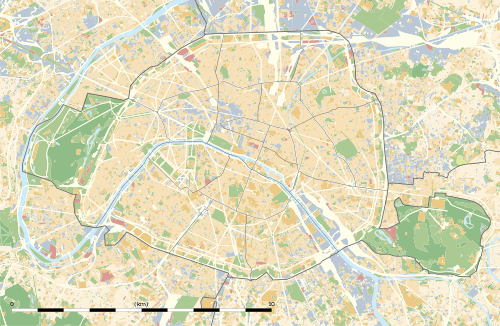 Montparnasse – Bienvenüe Location within Paris | ||||||||||||||||||||||||||
Montparnasse – Bienvenüe (French pronunciation: [mɔ̃paʁnas bjɛ̃vəny]) is a station of the Paris Métro which is a transfer point between lines 4, 6, 12 and 13. It is the fourth busiest station on the metro system and is located in Montparnasse at the intersection of the 6th, 14th and 15th arrondissements.
Location
Montparnasse – Bienvenüe station is located at the intersection of the 6th, 14th, and 15th arrondissements of Paris. Nearby are the Montparnasse district, the Tour Montparnasse office tower, the Musée Bourdelle (art museum), the Montparnasse Cemetery, the Musée de La Poste (postal museum) and the Jardin Atlantique (a rooftop garden on the roof of the Gare Montparnasse).
History
On 24 April 1906 the station opened as Montparnasse station in the Avenue du Maine at the southern end of the old Gare Montparnasse (at the site currently occupied by the Tour Montparnasse, before it was moved south of the Avenue du Maine in the 1960s) with the opening of the extension of line 2 Sud from Passy to Place d'Italie. On 14 October 1907 line 2 Sud became part of line 5. On 11 March 1910 the Montparnasse station was renamed Avenue du Maine and on 30 June 1933 it was renamed Bienvenüe in honour of the principal engineer of the Paris Métro, Fulgence Bienvenüe (accounting for the unusual diaeresis in the station's name). On 12 October 1942 the section of line 5 between Étoile and Place d'Italie, including Bienvenüe was transferred from line 5 to line 6 in order to separate the underground and elevated sections of the metro (because the latter were more vulnerable to air attack during World War II).
The line 4 platforms opened as Montparnasse in the Boulevard du Montparnasse, near the main entrance of the old Gare Montparnasse (on its northern side) on 9 January 1910 as part of the connecting section of the line under the Seine between Châtelet and Raspail. The line 12 platforms were opened in the Boulevard du Montparnasse on 5 November 1910 as part of the first section of the Nord-Sud Company's line C from Porte de Versailles to Notre-Dame-de-Lorette. This line was taken over by the Compagnie du chemin de fer métropolitain de Paris and was renamed line 12 on 27 March 1931. In 1913 a connection was opened between the platforms of lines 4 and line 12 situated on the Boulevard du Montparnasse, both called Montparnasse.
The line 13 platforms opened in the Avenue du Maine as Bienvenüe on 21 January 1937 as part of the original line 14 between Bienvenüe and Porte de Vanves and was connected to the line 5 platforms. This line became part of line 13 on 9 November 1976.
Connecting the southern and northern stations
At the end of the 1930s, a long corridor was built to connect the Montparnasse and Bienvenüe stations. Accordingly, the stations' names were fused to create the one now known as Montparnasse-Bienvenüe on 6 October 1942. This long corridor is now equipped with moving walkways to facilitate access between the two parts of the Métro station. The old Bienvenüe station serves lines 6 and 13, while the old Montparnasse station serves lines 4 and 12.
In 2002, in an experimental move, the RATP installed a moving walkway that moved at 12 km/h, which was then termed the "fastest in the world." (The speed has however since been reduced to 9 km/h). The first several metres consist of metal rollers that accelerate passengers as they hold onto the handrail, because it would be dangerous to step directly onto the fast-moving conveyor. However, RATP announced in May 2009 that they would replace the walkway with an ordinary one in March 2011 in response to 'numerous customer complaints concerning safety and unreliability'.
Barrière du Maine
The southern part of the station in the Avenue du Maine was the location of the Barrière du Maine, a gate built for the collection of taxation as part of the Wall of the Farmers-General; the gate was built between 1784 and 1788 and demolished in the nineteenth century.[1][2]
Layout
The lines are connected by passageways and mezzanines.
The layouts are ordered by the line number.
Line 4
| Northbound | ← |
| Southbound | |
Line 6
| Westbound | ← |
| Eastbound | |
Line 12
| Southbound | ← |
| Northbound | |
Line 13
| Northbound | ← |
| Southbound | |
Gallery
 Line 4 platforms at Montparnasse – Bienvenüe
Line 4 platforms at Montparnasse – Bienvenüe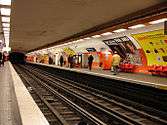 Line 6 platforms at Montparnasse – Bienvenüe
Line 6 platforms at Montparnasse – Bienvenüe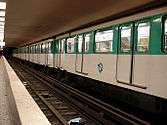 MP 73 rolling stock on Line 6 at Montparnasse – Bienvenüe
MP 73 rolling stock on Line 6 at Montparnasse – Bienvenüe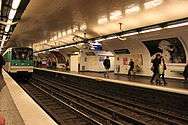 Line 12 platforms at Montparnasse – Bienvenüe
Line 12 platforms at Montparnasse – Bienvenüe Line 13 platforms at Montparnasse – Bienvenüe
Line 13 platforms at Montparnasse – Bienvenüe The new walkway during its experimentation phase
The new walkway during its experimentation phase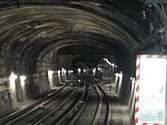 Connection between Lines 4 and 12
Connection between Lines 4 and 12
References
- ↑ "Barrière du Maine, picture" (in French). Bibliothèque nationale de France. Retrieved 19 December 2009.
- ↑ "Barrière du Maine" (in French). Bibliothèque nationale de France. Retrieved 19 December 2009.
| Wikimedia Commons has media related to Montparnasse - Bienvenüe (Paris Metro). |
| Paris Métro | Line 4 | |
|---|---|---|
| ||
| Paris Métro | Line 12 | |
|---|---|---|
| ||
| Paris Métro | Line 13 | |||||||||||||
|---|---|---|---|---|---|---|---|---|---|---|---|---|---|---|
| ||||||||||||||